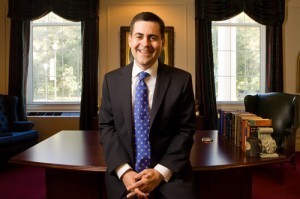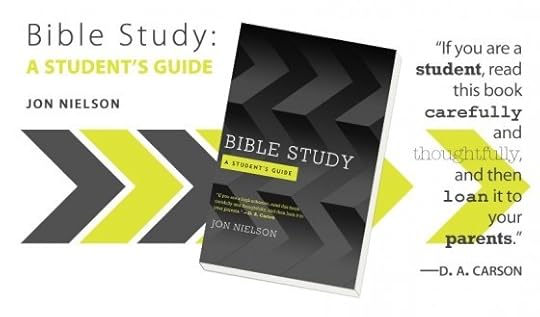Justin Taylor's Blog, page 164
April 7, 2013
Fal$e Teacher$
Shai Linne, whose album Lyrical Theology Part 1 will drop April 9, “names names” in his song “Fal$e Teacher$.” You can listen to it here:
He explains his motivation here:
If you’ll be at TGC, the RAAN meet-and-greet will be giving away a few copies of the album.
HT: @JohnPiper
April 6, 2013
The Best Touchdown in College Football This Year
My favorite college football team, the Nebraska Cornhuskers, honored a young man battling brain cancer at their spring game this weekend. You can read the story here, and watch his 69-yard touchdown below:
Praying for Rick and Kay Warren and Family
 Rick Warren sent the following email to the staff at Saddleback Church this morning:
Rick Warren sent the following email to the staff at Saddleback Church this morning:
To my dear staff,
Over the past 33 years we’ve been together through every kind of crisis. Kay and I’ve been privileged to hold your hands as you faced a crisis or loss, stand with you at gravesides, and prayed for you when ill. Today, we need your prayer for us.
No words can express the anguished grief we feel right now. Our youngest son, Matthew, age 27, and a lifelong member of Saddleback, died today.
You who watched Matthew grow up knew he was an incredibly kind, gentle, and compassionate man. He had a brilliant intellect and a gift for sensing who was most in pain or most uncomfortable in a room. He’d then make a beeline to that person to engage and encourage them.
But only those closest knew that he struggled from birth with mental illness, dark holes of depression, and even suicidal thoughts. In spite of America’s best doctors, meds, counselors, and prayers for healing, the torture of mental illness never subsided. Today, after a fun evening together with Kay and me, in a momentary wave of despair at his home, he took his life.
Kay and I often marveled at his courage to keep moving in spite of relentless pain. I’ll never forget how, many years ago, after another approach had failed to give relief, Matthew said, “Dad, I know I’m going to heaven. Why can’t I just die and end this pain?” but he kept going for another decade.
Thank you for your love and prayers. We love you back.
Pastor Rick
Our heart and prayer is with this dear family in this season of unimaginable pain. Greg Laurie, who lost his 33-year-old son in 2008, shares perhaps all that can be said in moments like this:
At times like these, there really are no words, but there is the Word.
There is no manual, but there is Emmanuel.
The Gospel Coalition Missions Conference and National Conference on Livestream
You can watch the Gospel Coalition pre-conference on mission (looking at 2 Corinthians) and the main conference (looking at the Gospel of Luke) live online.
I’ve reprinted the schedule below. All times are for the Eastern time zone (EDT).
Saturday, April 6
1:45 PM “The Biblical Basis for Missions: Treasure in Jars of Clay” (2 Cor. 4:1-12), Don Carson
3:15 PM “Are People Without Christ Really Lost?” Andy Davis
7:05 PM “Why the Great Commission is Great: Reaching More and More People” (2 Cor. 4:13-18), David Platt
Sunday, April 7
9:15 AM “The Heart of God in the Call to Proclaim: Our Goal: To Please Him” (2 Cor. 5:1-10), John Piper
10:45 AM “The Individual’s Suffering and the Salvation of the World,” Michael Oh
7:00 PM “Jesus and Justice,” Stephen Um
8:15 PM “The Ministry of Reconciliation” (2 Cor. 5:11-21), Mack Stiles
Monday, April 8
1:30 PM “Jesus the Son of God, the Son of Mary” (Luke 1:26-38; 2:1-21), John Piper
2:30 PM “Jesus Despised” (Luke 4:14-30), Colin Smith
4:00 PM “Jesus’ Transforming Power on Behalf of the Afflicted” (Luke 8:26-56), Crawford Loritts
7:15 PM “Jesus’ Resolve to Head Toward Jerusalem” (Luke 9:18-62), Don Carson
Tuesday, April 9
9:30 AM “Jesus and the Lost” (Luke 15:1-32), Kevin DeYoung
11:00 AM “Jesus and Money” (Luke 16:1-31), Stephen Um
7:00 PM “Did Jesus Preach the Gospel?” Don Carson, Kevin DeYoung, Tim Keller, and John Piper
Wednesday, April 10
9:30 AM “Jesus Betrayed and Crucified” (Luke 22:39-23:43), Gary Millar
11:00 AM “Jesus Vindicated” (Luke 24:1-53), Tim Keller
April 5, 2013
Martin Luther on How to Say Amen
Luther:
. . . you must always speak the Amen firmly.
Never doubt that God in his mercy will surely hear you and say “yes” to your prayers.
Never think that you are kneeling or standing alone, rather think that the whole of Christendom, all devout Christians, are standing there beside you and you are standing among them in a common, united petition which God cannot disdain.
Do not leave your prayer without having said or thought, “Very well. God has heard my prayer; this I know as a certainty and a truth.” That is what Amen means.
—Martin Luther, “A Practical Way to Pray” (1535), in Martin Luther’s Basic Theological Writings, 2d ed., ed. Timothy Lull (Minneapolis: Fortress Press, 2012), 35.
HT: David Sunday
April 2, 2013
A Silent Preacher of God’s Love and Grace
Michael Beates, author of Disability and the Gospel: How God Uses Our Brokenness to Display His Grace, shares his love for his daughter Jessica and how the Lord uses her presence in the lives of others:
Finally, A Book for High Schoolers on How to Study the Bible
I am thankful for Jon Nielson’s new book, Bible Study: A Student’s Guide (P&R, 2013). Nielson, formerly director of training for the Simeon Trust (which provides training in biblical exposition), was pastor for high school student at College Church in Wheaton, and now serves as their college pastor.
D. A. Carson writes in the foreword:
So if you are a high schooler, read this book carefully and thoughtfully, and then loan it to your parents. Chances are pretty good that they’ll benefit from it as much as you will. If you are a parent of high schoolers, or concerned for the welfare of high schoolers you know who are not your own children, put a copy of this book into their hands and encourage them to read it. Better yet, work through it with them, or at very least read it before you give it away. They won’t mind, especially if you tell them that the reason you are giving this book to them is because you have found it so helpful yourself.
You can read some of it online here.
Here is the table of contents:
The Bible Is God Speaking
The Bible Is Powerful
The Bible Is Understandable
The Bible Is a Literary Work
Exploring Biblical Genres
The Bible Is One Story
Studying the Bible as One Story
So . . . What Is Bible Study?
Barriers to Bible Study for Young People
Aids and Approaches to Bible Study
Leading Together
A Call to Young People
April 1, 2013
The New Go-To Book on Christianity and the Arts?
 Tim Keller on Jerram Barrs’s Echoes of Eden: Reflections on Christianity, Literature, and the Arts, forthcoming next month from Crossway:
Tim Keller on Jerram Barrs’s Echoes of Eden: Reflections on Christianity, Literature, and the Arts, forthcoming next month from Crossway:
Echoes of Eden is the most accessible, readable, and yet theologically robust work on Christianity and the arts that you will be able to find. It is biblical, theologically sound, filled with examples, and edifying. It anticipates and answers well all the most common questions that evangelical people ask about the arts. I highly recommend it.
Here is the table of contents:
1 God and Humans as Creative Artists
2 Imitation, the Heart of the Christian’s Approach to Creativity
3 Building a Christian Understanding of the Artist’s Calling
4 How Do We Judge the Arts?
5 Echoes of Eden: God’s Testimony to the Truth
6 The Conversion of C. S. Lewis and Echoes of Eden in His Life
7 Echoes of Eden in Tolkien’s Lord of the Rings
8 Harry Potter and the Triumph of Self-Sacrificing Love
9 Shakespeare and a Christian Worldview
10 Jane Austen, Novelist of the Human Heart
Appendix: The “Outing” of Dumbledore
An Interview with Russell Moore: The New President of the Ethics & Religious Liberty Commission
 The Ethics & Religious Liberty Commission of the Southern Baptist Convention has announced that Dr. Russell D. Moore has been elected as their eighth president, succeeding Dr. Richard Land, who completes 25 years of service in that role.
The Ethics & Religious Liberty Commission of the Southern Baptist Convention has announced that Dr. Russell D. Moore has been elected as their eighth president, succeeding Dr. Richard Land, who completes 25 years of service in that role.
Dr. Moore received his doctorate from the Southern Baptist Theological Seminary in 2001 and joined their faculty the same year, teaching theology and ethics. In 2004 he was elected dean of the school of theology and senior vice president for academic administration.
He is the author of The Kingdom of Christ: The New Evangelical Perspective, Adopted for Life: The Priority of Adoption for Christian Families and Churches, and Tempted and Tried: Temptation and the Triumph of Christ.
Dr. Moore was kind enough to answer a few questions.
Tell us a little bit about your own background and experience with ERLC.
I sense a calling to this, and I hesitate to say that because it sounds like such a cliche, what one is supposed to say when called to a new ministry position. But, in this case, there’s nothing else to say. This seems so right for me, and I am excited getting out of bed every morning to get to do this.
I struggled with a calling to Christian ministry as a very young man, maybe twelve or so, but then drifted away from that toward a political career. A very risk-taking congressman, Gene Taylor of Mississippi (who was and is my hero), invested a lot of time and effort in me, giving me opportunities that I can’t imagine now why he would give to someone that green. My wife Maria and I dated with her on the campaign trail with me, at little county fairs and fundraisers all over south Mississippi. After I sensed the call to ministry, I wondered why God had allowed those years to go in that direction, and I suppose I assumed they were “Jonah to Tarshish” years, even though I thoroughly loved them. I now see something of how many of the threads of God’s providence fit together.
Years ago, in late 1990 or early 1991, when I was working for Congressman Taylor, I was assembling various data points on the debates over the then-imminent Persian Gulf War. I was wrestling with the issue, thinking through how my convictions as a Christian ought to inform a sense of just war and the prudence of this action. I placed a call to the Washington office of the ERLC (then called the Christian Life Commission) to see if someone could help me think this through. I wound up speaking with Jim Smith, the organization’s first Washington staffer, who has since become a close friend. The conversation was theologically driven and immensely helpful. I remember thinking at that point (I was 19 years old), “I would love to be able to do what they do.”
It is humbling to see how all the little cul-de-sacs in my life story weren’t cul-de-sacs at all but the providence of God. I know that’s always the case, but often we don’t get to see it in this life.
Outside the Beltway and outside the Bible Belt many readers might be unfamiliar with the ERLC. What is its mission and why should we care about its work?
The ERLC has existed, under various names (Baptists, for some reason, love to change names), since the 1910s. Started to combat the liquor industry, the organization very early on adapted to a broader purpose of speaking to Southern Baptists about the social ethical aspects of the kingdom of God, avoiding both the Social Gospel and individualistic isolationism. The organization has been prophetic often in Baptist history. Foy Valentine, longtime president, led the effort for civil rights among Southern Baptists. He courageously called for integration, voting rights, and reconciliation in local churches, all the while representing a denomination rooted in the Jim Crow-occupied Deep South.
Valentine, while heroic on civil rights for African-Americans, was, quite unfortunately, opposed to civil rights for unborn Americans. He led the denomination to support liberalized abortion laws, even aligning what’s now the ERLC with the Religious Coalition for Abortion Rights, and celebrating Roe v. Wade. Some of this was rooted, I think, in a deep-seated anti-Catholicism within Baptist life at the time. Valentine was able to convince Southern Baptists that abortion was a “Catholic issue,” not ours. What a tragedy. I worked several years ago to write a resolution repudiating the early 1970s SBC resolutions in favor of abortion rights, and acknowledging our complicity in the abortion culture.
Richard Land, the retiring president of the ERLC, came into office in 1988 and was one of the first biblical inerrantists to head a Baptist entity after the conservative resurgence within the SBC. He quickly established himself as a leader in defining pro-life conviction and in calling for racial reconciliation. More than any other figure in Baptist life, Land deserves credit for leading Southern Baptists to a solidly pro-life ethic and in calling on conservatives to repent for the racism of our denominational past.
The broader world of evangelicals ought to care about the ERLC because the organization speaks to and for the largest Protestant denomination in North America, working with like-minded people on questions of ethical importance ranging from human trafficking to substance abuse to international religious freedom to pornography and beyond. The ERLC equips churches to think through ethical matters, and also seeks to advocate in the public arena for principles of justice.
My predecessor Foy Valentine hated the term “evangelical,” especially when the media started using the word in reference to Jimmy Carter in 1976. “Evangelical is a Yankee word,” he said.
Obviously, I disagree. Southern Baptists and other evangelicals need each other, not least of which because we’re not in self-contained worlds. The broader evangelical movement everywhere feeds into Baptist life, and Southern Baptists, along with some other groups, in many ways have anchored evangelicalism doctrinally and missiologically.
What are some things you’d like to see ERLC accomplish in the near future?
Three words: “Kingdom. Culture. Mission.”
I would like to see the ERLC serve as a catalyst for a kingdom vision that transforms congregational cultures to carry out the mission of Christ in the world. This means speaking to the larger culture and to the political arena, but not as an interest group wielding power to get our way. The time has come to replace moral majoritarianism with moral communitarianism.
The locus of the kingdom of God in this age is within the church, where Jesus rules as king. As we live out lives together, we see the transforming power of the gospel and the inbreaking of the future kingdom. The first step of cultural and political engagement is congregations full of people who demonstrate the gospel. Your congregation’s decision to accept a list of new members is more significant in the long-term than a presidential election. The United States, after all, is but a vapor in the vast sweep of cosmic time. Our churches, however, point to the future kings and queens of the universe, where there are no term limits. If we are to be credible, we must recover meaningful membership, church discipline, and congregations that tear down carnal distinctions as we point to kingdom communities that are at peace with God and with one another, and at war with the devil.
That doesn’t lead to isolationism. The kingdom of God shows us, as Carl Henry put it, “the criteria by which God will judge men and nations.”
I hope to prompt Christians to think through what following Jesus means in an often turbulent new age of ethical questions. Should we baptize human clones? What does repentance look like for the post-op transsexual? What should we do if the government forbids chaplains to pray in Jesus’ name? What should we do with a church that sinfully refuses to welcome those of another ethnicity?
I also hope to advocate in the public square for the dignity of human persons, made in the image of God, regardless of whether those persons are labeled “embryos” or “fetuses” or “illegal immigrants” or whatever word is used to dehumanize and depersonalize.
And I hope to rekindle the Baptist witness for religious liberty. My forebears went to jail for preaching without a license. That day may well, God forbid, come again. Like Paul appealing to his Roman citizenship, I want to persuade our governing authorities that the First Amendment guarantees of religious liberty aren’t grants from Caesar but natural rights bestowed by God on all people. That’s freedom for all people, not just conservative evangelicals. If the government can zone a mosque out of existence in your local community, it can do the same for a gospel church. And, more than that, religious liberty is a gospel matter. No one is converted through the power of the state. We wield the power of the Spirit, through the persuasion of the gospel witness, not the power of state coercion.
If we can’t keep the next generation from going to jail, though, I hope we can prepare the next generation to go to jail for the right reasons. I hope we can equip churches to form consciences that can tell the difference between “Jesus is Lord” and “Caesar is Lord.”
What encourages you and what discourages you most these days about the way Christians are thinking about and interacting with politics?
Evangelicals tend to ping back and forth between dangerous extremes. Some evangelicals have idolized politics in a way that led to demonizing opponents and baptizing allies, living and dead. American Christianity has too often been a political agenda in search of a gospel useful enough to accommodate it. A younger generation rightly rejected the triumphalism and hucksterism of some aspects of the old Religious Right. But, in reclaiming the centrality of the gospel, some are tempted to fall back into the old dispensationalism of divorcing the kingdom from the gospel, Paul from the prophets and from Jesus. “And who then is my neighbor?” isn’t simply a bad social ethic, it’s a matter of denying the gospel mission Jesus embodied and has handed to us.
Despite that, I am encouraged about the future of Christians embracing these issues. I think we are ready to live in the tension of prophetic distance and prophetic engagement. Prophetic distance in that we don’t become mascots for any political faction, adding Bible verses to somebody’s agenda when called upon to do so. Prophetic engagement in that we understand that the gospel speaks to the whole of reality, including the decisions we make together in civil society and statecraft.
A gloomy “slouching toward Gomorrah” view of culture leads, I think, to meanness. If we think we are on the losing end of the arc of history, we slide into outrage. If we see ourselves, though, as part of a kingdom that is triumphant in Christ, we ought to display a kind of provocative tranquility. We see those who disagree with us not as threatening to us or to our gospel, but those who, like all of us were, are held captive to an accusing power. We speak with convictional kindness because we love our neighbors, and because we are confident in our gospel. If the gates of hell won’t prevail against Jesus’ onward march, then why are we terrified by Hollywood or Capitol Hill?
March 31, 2013
Justin Taylor's Blog
- Justin Taylor's profile
- 44 followers




